George Floyd anniversary: Derek Chauvin conviction 'nothing to celebrate'
- Published
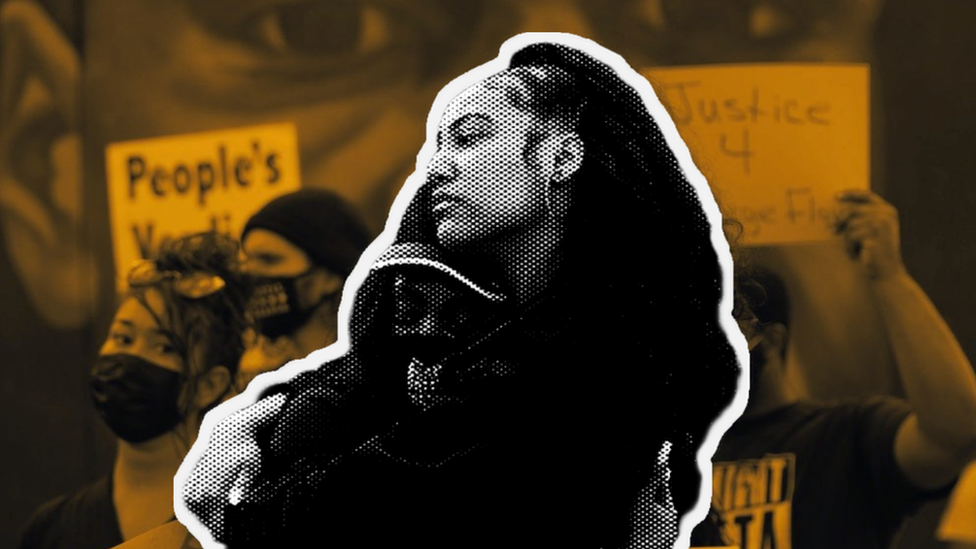
Derek Chauvin was found guilty on all three counts after a three-week trial
The now-infamous video showing George Floyd's final moments shone a glaring spotlight on racism and police brutality against black people.
For some, the rare conviction in the US of white police officer Derek Chauvin for the killing of a black man proves that justice has been served.
But for many people, it's not so simple.
Toni, a 28-year-old camera operator, heard April's verdict from his hotel room after a long day of location shooting for work.
"I can't really describe the feeling, but it was certainly not celebratory," he says. "It's ironic that it felt more like a massive sigh of relief, a deep breath.
"Did it give me more faith in the justice system? Not really."
Last year, I spoke to three young black people from different parts of the world about the killing of George Floyd.
A year later, I caught up with Toni Adepegba, Laëtitia Kandolo and Nia Dumas to find out what the conviction means to them, and to see whether, like me, they have struggled to find the words to articulate their feelings.
'Nothing to celebrate'
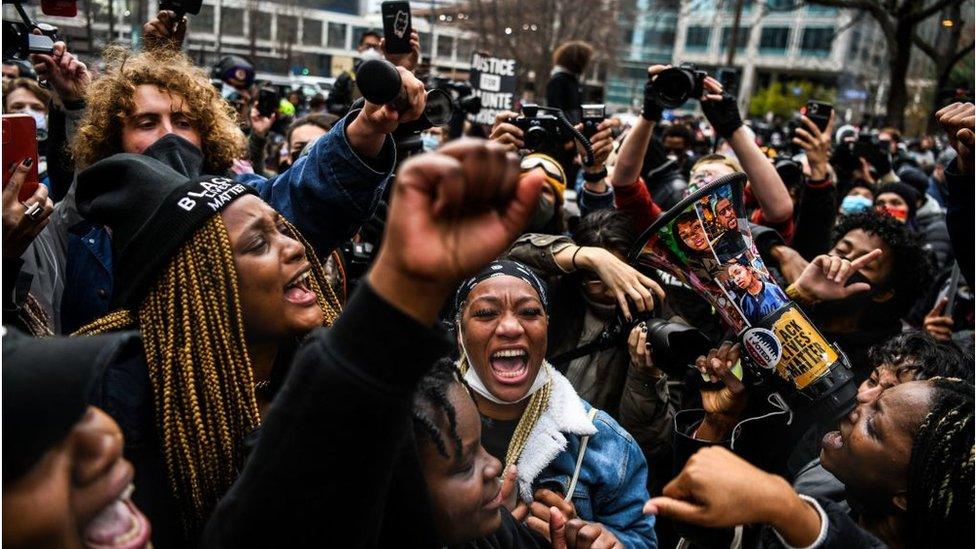
Americans celebrate as Derek Chauvin's guilty verdict is announced
Despite a brief celebration, it wasn't long after news of the conviction broke that I became aware of an acute sadness and a sense of unresolved emotion. And I wasn't alone.
"I was home and I saw [the announcement] post on my Instagram and went on Twitter to find out more," recalls Laëtitia.
"I don't think happy is the right word because you're happy for the first five minutes then you realise that this shouldn't have happened in the first place.
"There is nothing to celebrate because you know that it's just the one time in this entire history and these murders happen every day and will continue to happen."
Toni found the news hard as well.
"You want to see hope, when you hear that he's been convicted on all charges you want to think or believe that things will change now," he says.
"Ultimately, I think until the bigger issues are addressed these things are going to keep happening, just like with Ma'Khia Bryant."
Sixteen-year-old Ma'Khia Bryant was shot dead by a white police officer in the US state of Ohio, who had been responding to an emergency call over an attempted stabbing.
Nicholas Reardon shot the black teenager about 30 minutes before the verdict was delivered in Chauvin's trial. She was attacking another girl with a knife at the time.
'It stays with you'
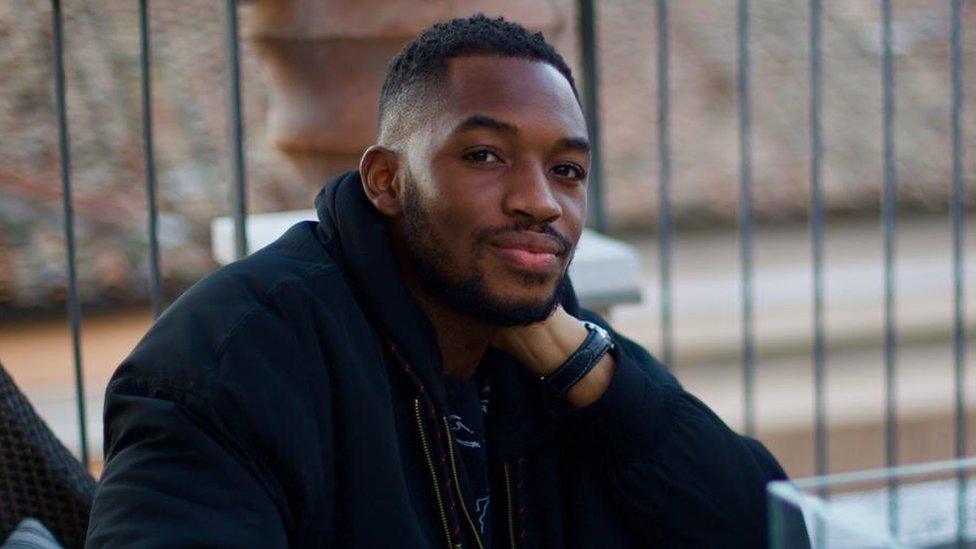
UK-based camera operator Toni Adepegba has taken up therapy to help deal with a challenging year
The George Floyd video has been a turning point for DR Congo-based designer Laëtitia, who initially believed sharing videos may be the only way to hold racists to account. Now she thinks the cost might be too high.
"Every time there's a similar incident it just me gives me flashbacks to the Floyd video," she says.
"I start thinking how this person was treated in their final moments, did they cry out for their mother too, can you see the desperation in their eyes, can you see them realise that this is the end? It stays with you. "
Just like the video itself, conversations around race have been inescapable over the last year for many people.
For Toni, the pandemic shifted these discussions in a way he hadn't experienced before and reignited the momentum around Black Lives Matter.
"We were in a period where everyone's stuck at home, so a lot of people had more time to really sit down to process some uncomfortable truths," he says.
The weight of these difficult conversations continues to impact the mental health of many black people. I have felt exhausted and overwhelmed.
During the trial new police bodycam footage was released showing the lead up to George Floyd's arrest and death.
"I don't feel like I need to revisit [the] trauma, so I haven't watched the full clip of his final moments again," Toni says.
"I'm mindful of letting that heaviness into my system because I know that it's going to take a toll on me emotionally, mentally, spiritually, and physically - I have to do what I can to keep my soul at peace."
Toni has decided to take up therapy to find a way of navigating and coping with a very challenging year.
Initially, he was hesitant in seeking help because of the lack of diversity in mental healthcare in the UK.
"The reality is none of these people looked like me, all of them were white and I just didn't have anyone who I could relate to," he says.
"I think seeking professional help again was more about equipping myself with tools to help other people, not only because of Black Lives Matter but we're also going through a season where there's just so much that has affected and is triggering our community.
'I don't have the privilege to exist'
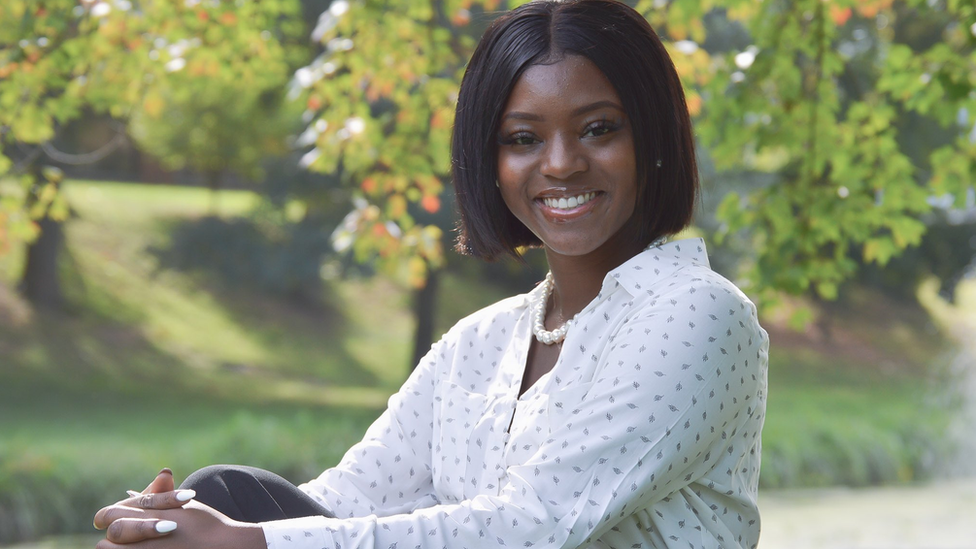
'It made me mature quickly because you realise that if you're a black person in America, this is what happens'
Until the very last moment, Nia thought Chauvin would be found not guilty.
The 20-year-old student has grown up in the US alongside a list of names and hashtags - campaigns for justice - that all ended without a conviction.
Many of the victims' names are familiar to people in the US and around the world as examples of police brutality and racism; Breonna Taylor, Eric Garner, Sandra Bland, Tamir Rice to name just a few.
"I remember watching the Trayvon Martin case and then going to school and learning about the three branches of government and how it works," says Nia.
"At 11 years old, I'm thinking, of course he's going to be convicted because we just learned last week that if you break the law will be held to account."
Trayvon Martin was an unarmed black 17-year-old, shot dead by a Florida neighbourhood watchman, who was acquitted for murder in 2012 on the grounds of self-defence.
The list of names kept growing.
"Then a few years on from Trayvon, it was Michael Brown, then Tamir Rice who's actually from my hometown."
For Nia, growing up in inner-city Cleveland, her best childhood memories are a blur of visits to the cinema and endless days at the skating park with her friends.
"The one thing I miss about being younger is that I could go to school, the store or just anywhere without having comments made about me that relate to my blackness," she says,
"I don't really have the privilege to just exist anymore.
"It made me mature quickly because you realise that if you're a black person in America, this is what happens."
George Floyd isn't a martyr
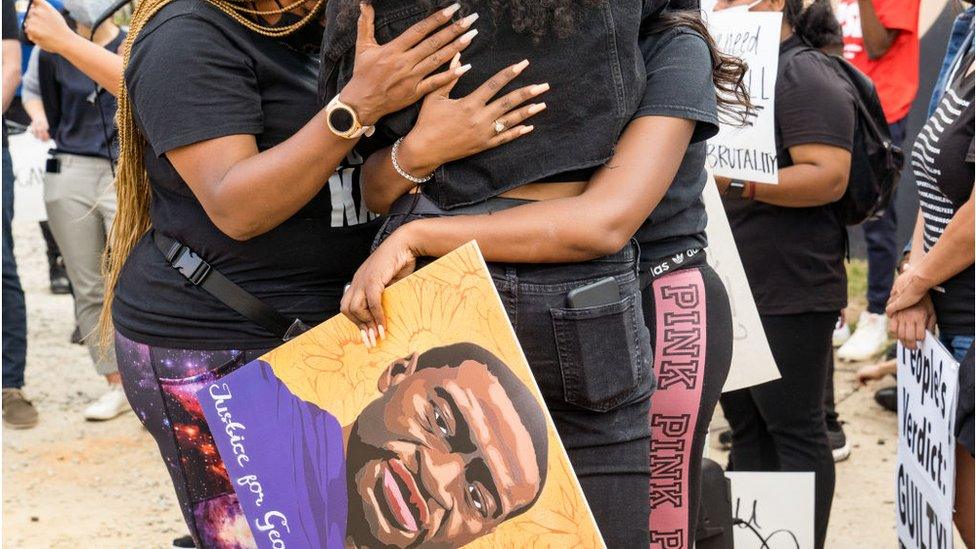
Nia Dumas: 'It's not that we want police officers to get convicted after killing us - we don't want them to kill us at all'
Some people say George Floyd has been used by politicians as a martyr.
"He's actually a murder victim," says Nia. "They think it's going make black people more accepting [of the situation] if he died for a supposedly greater cause."
"My problem is with how the government is framing this, it's not that we want police officers to get convicted after killing us - we don't want them to kill us at all."
About 1,000 people a year are killed by police officers in the US, according to an independent project that tracks police violence, external. Most are shot.
Despite African Americans making up only around 13% of the population, research shows, external that police fatally shoot unarmed black people more than three times the rate of white people.
Nia believes that there is systemic racism in policing in the US and until it is dealt with, nothing meaningful will come from the Chauvin conviction.
"I think the reason why they're just focus on convictions is because they don't want to make structural changes, so this is like an alternative win to pacify us," she says.
'A different kind of freedom'
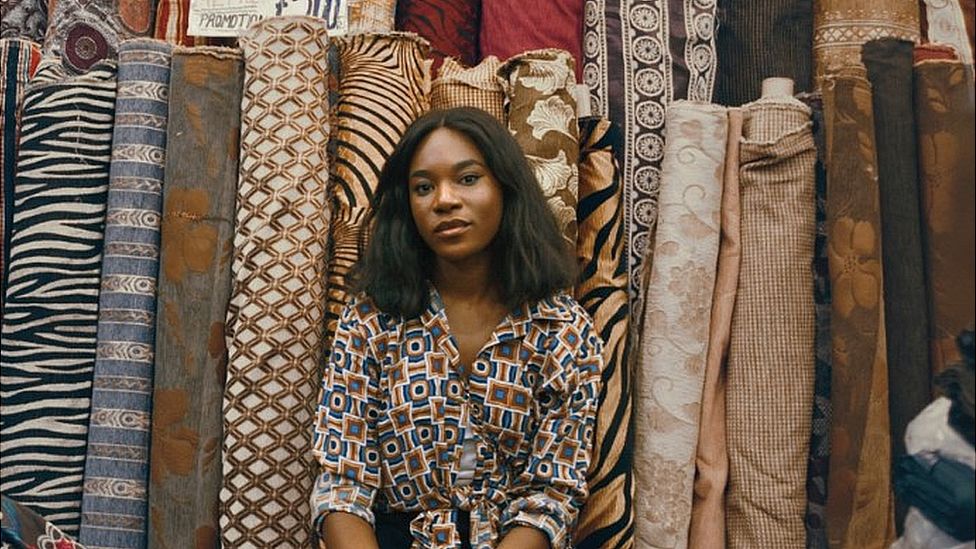
'I really feel like maybe the pandemic just sent me home because I really don't see myself living in Paris'
During the height of the global Black Lives Matter protests in 2020, Laëtitia was living in Paris as statues were toppled and hundreds of thousands took to the streets in a united stand against racism.
Now the 29-year-old resides in Kinshasa, in DR Congo, having moved in September.
"I'm living somewhere that I can fully be myself," she says.
Her flat overlooks a dusty road where she can hear the neighbourhood children playing and the latest Rumba soundtrack fills the humid air.
"They have a different kind of freedom and it's on a level that I never had, I'm talking about the mental and physical space to be themselves. They're not black children here, they are simply children," she says.
"I really feel like maybe the pandemic just sent me home because I really don't see myself living in Paris, which is crazy to say.
"I'm not saying that everybody should or can move to Africa because it's not easy, but I think once you've experienced a country where you feel fully accepted somehow you can't just go back.
"We're born or grow up in these places where it's set up in our heads that this is the way it is and what I'm saying is that it shouldn't feel OK."
'It's black or white'
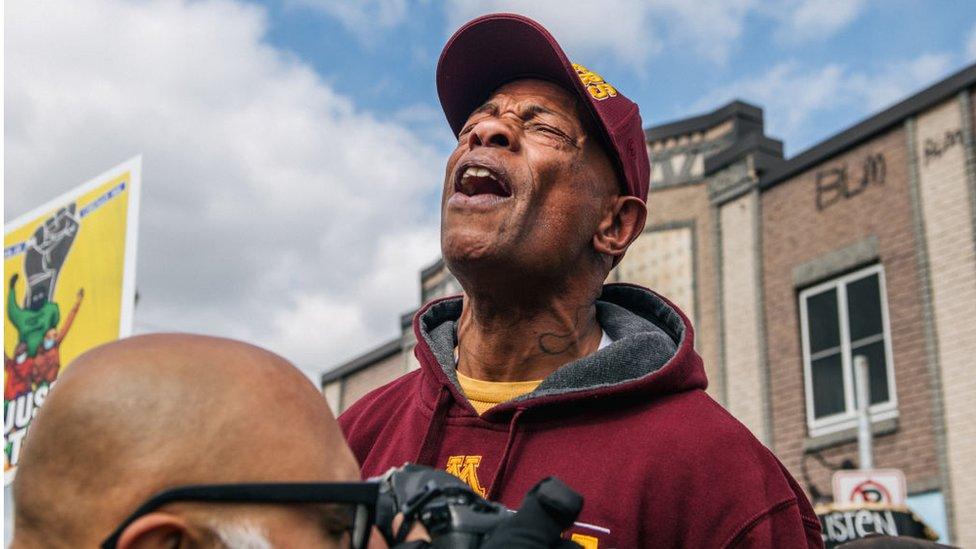
Toni Adepegba: 'Justice is [George Floyd] not going through the death that he did, regardless of whatever he's supposed to have done'
Many black people, just like Nia, Laëtitia and Toni believe that being black means that you are not afforded the same margins for error as white people.
Some people believe it's this lived-in experience that is at the core of understanding why George Floyd died.
"When you're the only black person, you're always watching yourself and you see how other people look at you like you're somehow lost or misplaced," says Laëtitia.
"But it's also difficult living with that pressure, so you're always thinking and working twice as hard - while others work to make things OK, you're striving for perfection."
"Justice is [George Floyd] not going through the death that he did, regardless of whatever he's supposed to have done," says Toni.
A store employee reported Mr Floyd to the police, believing the $20 bill he used to buy a pack of cigarettes was counterfeit. Half an hour later, George Floyd was dead.
The trial and conviction of Derek Chauvin feels like an exception, rather than the natural course of a justice system that serves everyone fairly.
For Nia, Laëtitia and Toni, it's simple - if the system was truly equal, then George Floyd would still be alive.